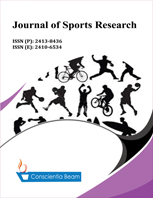Dual Cognitive Tasks Provoke Temporo-Spatial Gait and Anticipatory Postural Adjustments in Healthy Young Adults
DOI:
https://doi.org/10.18488/journal.90.2021.81.26.34Abstract
Usually, dual cognitive tasks require additional attention to maintain postural control during standing and walking. In certain pathologies or injuries, dual cognitive tasks, such as walking and speaking, can challenge the balance system, making certain gait deficiencies more apparent. The issue is identifying normal gait changes compared to gait impairments to understand better the impact cognitive tasks have on gait mechanics. Purpose: To identify changes in temporospatial gait parameters in healthy young adults while walking and performing a cognitive task. Methods: Thirty-four healthy young adults participated in this study. We collected gait parameters with six gyroscopes and accelerometers (distributed on all limbs and trunk) during the 7-meter walk test. Two trials were performed with just walking at a self-selected pace (single task). Then, the participant was asked to perform a cognitive task by counting backward by three from 100 while walking for 7m for two more trials (dual cognitive task). Results: Dual cognitive tasks provoked significant adaptations (p<.05) in gait parameters, such as increased double limb support time and stance phase with a reduction in single limb support time and swing phase. Increase the length of the walking cycle by decreasing the cadence and speed of walking speed. In addition, an increase in mediolateral postural sway, first-step initiation time, and trunk range of motion was observed. Conclusion: Dual cognitive tasks can cause normal alterations in the gait's dynamic component and variations in walking initiation. We recommend studying neuromuscular modification, such as changes in muscle activation, during dual cognitive tasks.

